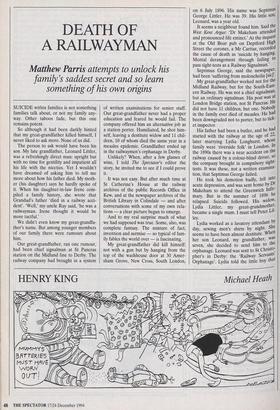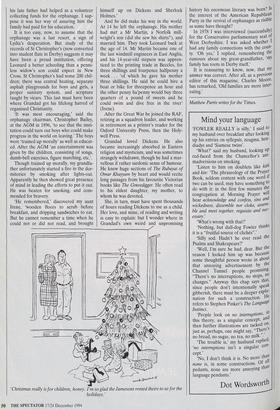DEATH OF A RAILWAYMAN
Matthew Parris attempts to unlock his
family's saddest secret and so learn something of his own origins
SUICIDE within families is not something families talk about, or not my family any- way. Other taboos fade, but this one remains potent.
So although it had been darkly hinted that my great-grandfather killed himself, I never liked to ask more. None of us did.
The person to ask would have been his son. My late grandfather, Leonard Littler, was a refreshingly direct man: upright but with no time for gentility and impatient all his life with the niceties. Yet I wouldn't have dreamed of asking him to tell me more about how his father died. My moth- er (his daughter) says he hardly spoke of it. When his daughter-in-law Irene com- piled a family history, she wrote that Grandad's father 'died in a railway acci- dent'. 'Well,' my uncle Ray said, 'he was a railwayman. Irene thought it would be more tactful.'
We didn't even know my great-grandfa- ther's name. But among younger members of our family there were rumours about him.
Our great-grandfather, ran one rumour, had been chief signalman at St Pancras station on the Midland line to Derby. The railway company had brought in a system of written examinations for senior staff. Our great-grandfather never had a proper education and feared he would fail. The company offered him an alternative job as a station porter. Humiliated, he shot him- self, leaving a destitute widow and 11 chil- dren, 10 of whom died the same year in a measles epidemic. Grandfather ended up in the railwaymen's orphanage in Derby.
Unlikely? When, after a few glasses of wine, I told The Spectator's editor the story, he invited me to see if I could prove it.
It was not easy. But after much time at St Catherine's House at the railway archives of the public Records Office in Kew, and at the newspaper archives of the British Library in Colindale — and after conversations with some of my own rela- tions — a clear picture began to emerge.
And to my real surprise much of what we had supposed was true. Some, also, was complete fantasy. The mixture of fact, invention and surmise — so typical of fam- ily fables the world over — is fascinating.
My great-grandfather did kill himself: not with a gun but by hanging from the top of the washhouse door at 30 Amer- sham Grove, New Cross, South London, on 6 July 1896. His name was Septimus George Littler. He was 39. His little son, Leonard, was a year old.
It seems a neighbour found him. Said the West Kent Argus: 'Dr Makeham attended and pronounced life extinct.' At the inquest at the Old Boar pub on Deptford High Street the coroner, a Mr Carttar, recorded the cause of death as 'suicide by hanging. Mental derangement through failing to pass sight-tests as a Railway Signalman.'
Septimus George, said the newspaper, had been 'suffering from moloncholia [sic] '• My great-grandfather worked not for the Midland Railway, but for the South-East- ern Railway. He was not a chief signalman, but an ordinary signalman. His post was at London Bridge station, not St Pancras. He did not have 11 children, but one. Nobody in the family ever died of measles. He had been downgraded not to porter, but to tick- et inspector. His father had been a butler, and he had started with the railway at the age of 22, later marrying Lydia Longhurst, whose family were 'riverside folk' in London. In the 1890s there was a near accident on the railway caused by a colour-blind driver, so the company brought in compulsory sight- tests. It was these, not a written examina- tion, that Septimus George failed. He took his demotion badly, fell into acute depression, and was sent home by Dr Makeham to attend the Greenwich Infir- mary. But in the summer of 1896 he relapsed. Suicide followed. His widow, Lydia Littler, my great-grandmother, became a single mum. I must tell Peter
ley.
Lydia worked as a lavatory attendant by day, sewing men's shirts by night. She seems to have been almost destitute. When her son Leonard, my grandfather, was seven, she decided to send him to the orphanage. Leonard was sent to St Christo- pher's in Derby: the 'Railway Servants Orphanage'. Lydia told the little boy that
his late father had helped as a volunteer collecting funds for the orphanage. I sup- pose it was her way of assuring him the family had paid for his education.
It is too easy, now, to assume that the orphanage was a last resort, a sign of Lydia's desperation. But study of the records of St Christopher's (now converted into student flats in Derby) suggests it may have been a proud institution, offering Leonard a better schooling than a penni- less widow's son could expect in New Cross. St Christopher's had some 200 chil- dren; there was central heating, separate asphalt playgrounds for boys and girls, a proper sanitary system, and scripture taught by vicars. This last must have been where Grandad got his lifelong hatred of organised Christianity.
'It was most encouraging,' said the orphanage chairman, Christopher Bailey, at the AGM in 1896, `to see that the insti- tution could turn out boys who could make progress in the world on leaving.' The boys were 'trained up morally' as well as educat- ed. After the AGM 'an entertainment was given by the children, consisting of songs, dumb-bell exercises, figure marching, etc.'.
Though trained up morally, my grandfa- ther unfortunately started a fire in the dor- mitories by smoking after lights-out. Apparently he then showed great presence of mind in leading the efforts to put it out. He was beaten for smoking, and com- mended for bravery.
'He remembered,' discovered my aunt Irene, 'wooden floors to scrub before breakfast, and dripping sandwiches to eat. But he cannot remember a time when he could not or did not read, and brought himself up on Dickens and Sherlock Holmes.'
And he did make his way in the world. At 14 he left the orphanage. His mother had met a Mr Martin, a Norfolk mill- wright's son (did she sew his shirts?), and married him. They took Leonard back at the age of 14. Mr Martin became one of the last windmill engineers in East Anglia, and his 14-year-old stepson was appren- ticed to the printing trade in Beccles, for three shillings and fourpence halfpenny a week . . . 'of which he gave his mother three shillings. He said he could hire a boat or bike for threepence an hour and the other penny ha'penny would buy three quarters of a pound of sweets and he could swim and dive free in the river' (Irene).
After the Great War he joined the RAF, retiring as a squadron leader, and working in retirement as a printer's reader for the Oxford University Press, then the Holy- well Press.
Grandad loved Dickens. He also became increasingly absorbed in Eastern religion and mysticism, and was sometimes strangely withdrawn, though he had a mar- vellous if rather sardonic sense of humour. He knew huge sections of The Rubayat of Omar Khayyam by heart and would recite long passages from his favourite Victorian books like The Gravedigger. He often read to his eldest daughter, my mother, to whom he was devoted.
She, in turn, must have spent thousands of hours reading Dickens to me as a child. Her love, and mine, of reading and writing is easy to explain: but I wonder where in Grandad's own weird and unpromising `Christmas really is for children, honey. I'm so glad the Jamesons rented theirs to us for the holidays.' history his enormous literacy was born? Is the interest of the American Republican Party in the revival of orphanages as risible as some have thought?
In 1978 I was interviewed (successful/3i) for the Conservative parliamentary seat of West Derbyshire. I was asked whether I had any family connections with the coun- ty. `Oh yes,' I replied, remembering the rumours about my great-grandfather, 'tlaY family has roots in Derby itself.' It is reassuring to know, now, that mY answer was correct. After all, as a previous editor of this magazine, Charles Moore, has remarked, 'Old families are more inter- esting.'
Matthew Parris writes for the Times.











































































































 Previous page
Previous page